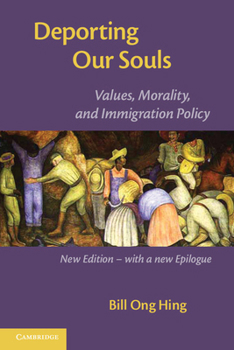Deporting Our Souls: Values, Morality, and Immigration Policy
Select Format
Select Condition 
Book Overview
In the past three decades, images of undocumented immigrants pouring across the southern border have driven the immigration debate and policies have been implemented in response to those images. The... This description may be from another edition of this product.
Format:Paperback
Language:English
ISBN:1107626781
ISBN13:9781107626782
Release Date:May 2013
Publisher:Cambridge University Press
Length:240 Pages
Weight:0.62 lbs.
Dimensions:0.7" x 6.0" x 8.9"
Customer Reviews
3 ratings
Humanizing the Immigration Debate
Published by Thriftbooks.com User , 18 years ago
Two of the biggest problems in the current debate over immigration reform are the persistence and proliferation of misinformation, and the demonizing of illegal immigrants. This book by the aptly named Bill Ong Hing (if you can't see why his name is appropriate, just say it out loud quickly) is a nice corrective to these widespread problems. First, Hing addresses the impact of undocumented workers on the economy in a way that avoids the shrill rhetoric that is often involved and addresses the data with great sobriety. Rather than focusing on any one particular study (as we all too often tend to do), he addresses the general trend of the data. In the process, he calls our attention to many neglected ways in which undocumented workers impact the economy. For example, while many people focus intently on the question of whether undocumented workers drive down wages or export earnings to other countries, few address the role of undocumented workers as consumers; Hing does. Few address the long-term contribution of undocumented workers; Hing does. Many people express concerns that undocumented workers are not paying taxes, but rather "draining" resources from the system; Hing reveals the many ways in which they contribute to the system, including, yes, paying taxes. Hing also does an outstanding job of humanizing undocumented workers. His long experience as a lawyer dealing with immigration issues provides him with a wealth of examples to draw on. This, to me, is the most important part of the book--in it, we come to see undocumented workers not as a poor, violent class of lawbreakers (as they are all too often presented), but as people with the same desires to provide a good life for themselves and their families that we all share. Hing helps us to see through the eyes of the other the daily trials we impose upon illegal, and even legal, immigrants. It would take a cold-hearted person indeed to not be moved by many of the cases Hing provides. All this is, in the end, aiming at defending a policy of guest worker programs with significant and timely opportunities for citizenship. Hing rightly notes that without such opportunities, guest worker programs amount to little more than exploitation. He also defends a widespread provision of citizenship opportunities for those already here; and unlike those Republican pundits who talk "family, family, family" but rarely act to help actual families (preferring to support some abstractum known as "The Family"), Hing's proposal supports the maintenance of families by making familial relations a central consideration in providing citizenship opportunities. Hing's book is not without its failings. He fails to address for more than a few sentences the crucial issue of responsibilities we owe to immigrants due to our past foreign policy decisions. (NAFTA, for example, has put many farmers throughout the Americas out of work; and our continual meddling in the political decisions of other Ameri
The Great Immigration Panic
Published by Thriftbooks.com User , 18 years ago
In early June 2008, the NY Times ran an editorial entitled, "The Great American Panic," pointing out that years from now, we will look back at this immigration-enforcement era with shame. Professor Hing's book provides the substantive support for this argument. Indeed, we are shaming ourselves with policies that are evil and embarrassing. It's time for policy makers to wake up, and do the right thing.
A calming voice in a storm of fear.
Published by Thriftbooks.com User , 18 years ago
In a book published in October 2006: Deporting Our Souls.... Values, Morality and Immigration Policy, Bill Ong Hing makes a very strong case for a much more humane immigration policy in the United States. Hing who is on the faculty at UC Davis Law School argues that we need a new approach to immigration: "My solution is simple." He writes. "Calm down. Welcome undocumented workers...." His is a refreshing voice in a storm of fear. He uses lots of examples showing how the US's past immigration policy has mistreated people. He also shows how applications of the same policies are effecting people today. One example he uses is how Operation Gatekeeper, which sealed the border near El Paso drove the migrants into the Arizona desert where thousands have died. His argument for immigration is not the ethics argument used by the Radical Immigration movement, that humans have the basic right to migrate as long as they are not an undue burden on the place they settle. He argues that we should allow immigration because it is the compassionate thing to do, that we have a responsibility to others wherever they live and that immigration is good for all of us. He does not argue for, in the words of Bruce Ackerman, "an immigrant's prima facie right to demand entry into a liberal state." Hing believes that the US can make better rules for immigrants and the problem can be solved. The book ends with these lines: ". we should fully embrace newcomers in our midst with open arms, for they are our neighbors and, in a real sense, our own collective relatives." His is a welcome sentiment in a sea of anger.






